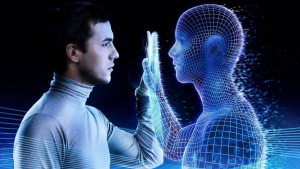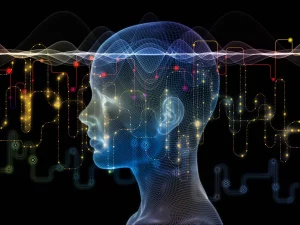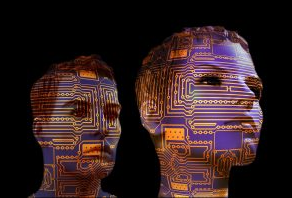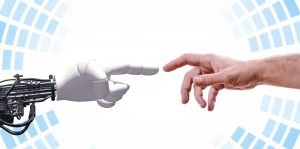A groundbreaking development in artificial intelligence (AI) has stirred conversations around the world as it demonstrates the power of technology in bridging the gap between life and death. A young man in China has used AI to create a lifelike virtual version of his grandmother, who passed away due to COVID-19. This remarkable feat has captured the attention of millions, giving them hope of bringing their deceased loved ones back to life using AI. Meanwhile, it also sparks a heated debate on the ethical implications of using AI to reconnect with the departed.
Also Read: Futurist Ray Kurzweil Claims Humans Will Achieve Immortality by 2030
The Miraculous Reunion
The protagonist of this story is a Chinese man who turned to AI technology to cope with the loss of his beloved grandmother. Utilizing advanced AI algorithms, he created a virtual model of his late relative, allowing him to communicate with her and relive cherished memories. News of this development spread like wildfire, with multiple sources reporting on the extraordinary case, which quickly went viral on social media platforms and major news outlets worldwide.

AI Advancements: Giving Voice to the Departed
The concept of using AI to “speak” with deceased individuals is not entirely new. Technological advancements over the years have made it possible. Researchers and tech enthusiasts have developed AI-powered platforms that allow users to have simulated conversations with those who have passed away. These systems often rely on a wealth of personal data and digital records to create personalized responses that mimic the personality and speech patterns of the deceased. However, the case of the Chinese man and his virtual grandmother represents a significant leap forward, showcasing the increasingly sophisticated capabilities of AI in recreating realistic interactions with departed loved ones.

Also Read: Top 5 AI Voice Generators: Enhancing Your Business with Next-Gen Voice Solutions
Ethical Considerations: To Reanimate or Not to Reanimate
The powerful impact of AI in reconnecting with deceased loved ones has generated a heated debate surrounding the ethical implications of this technology. Critics argue that resurrecting the dead through AI could exacerbate the grieving process. They say this would make it difficult for individuals to accept the reality of their loved one’s passing. Others have raised concerns about potential misuse, with digital representations of the deceased being used for nefarious purposes or causing emotional distress to the surviving family members. Proponents of the technology, however, maintain that it offers a unique opportunity for healing and connection, providing solace to those who have lost someone dear to them.

Also Read: Is Uploading Consciousness to Computers Possible? | Techie offers Afterlife Solutions
As AI technology continues to evolve, so too must the conversations surrounding its ethical use in relation to the deceased. Researchers, ethicists, and industry experts must collaborate to establish clear guidelines and protocols to ensure that AI is harnessed responsibly in this sensitive area. This may involve establishing limitations on data access, requiring consent from surviving family members, and creating safeguards to protect against potential abuse. The use of AI to virtually bring back deceased loved ones is indeed an emotionally and socially sensitive topic, that needs to be taken forward with a balanced approach.
The Future of AI and Human Connection
The case of the virtual grandmother serves as a powerful reminder of the potential of AI in transforming our relationships with those we have lost. As AI technology becomes increasingly sophisticated, it may offer new ways for individuals to reconnect with their deceased loved ones, creating a space for healing and remembrance. However, the ethical complexities of these developments must be carefully considered to ensure that AI is utilized responsibly, striking a balance between innovation and empathy.

Also Read: Virtual World Created by AI Develops Human-Like Features
Our Say
The ability to bring back or connect with our deceased loved ones using AI technology is definitely groundbreaking. As the world continues to explore the potential of artificial intelligence, it is essential to remain mindful of the ethical implications. This is especially true in the case of using this technology to recreate connections with those who have passed away. With responsible application and thoughtful consideration, AI has the potential to provide comfort and solace for those grieving the loss of a loved one while fostering innovation and empathy.
By engaging in open, honest discussions about the ethical complexities surrounding AI’s use in reanimating the deceased, researchers, ethicists, and the public can work together to ensure that these powerful tools are harnessed for good, creating a future where technology enhances human connection in a respectful and responsible manner. As we continue to push the boundaries of what AI can achieve, it is crucial to strike the right balance, shaping a world where progress and compassion go hand in hand.
Also Read: Your Clone Will Work for You With Aphid’s aClones
Related
- SEO Powered Content & PR Distribution. Get Amplified Today.
- Platoblockchain. Web3 Metaverse Intelligence. Knowledge Amplified. Access Here.
- Source: https://www.analyticsvidhya.com/blog/2023/04/ai-brings-deceased-loved-ones-back-to-life/
- :has
- :is
- a
- ability
- About
- abuse
- Accept
- access
- Achieve
- advanced
- advancements
- against
- AI
- AI-powered
- algorithms
- Allowing
- and
- Application
- approach
- ARE
- AREA
- argue
- around
- artificial
- artificial intelligence
- Artificial intelligence (AI)
- AS
- attention
- back
- Balance
- BE
- becomes
- being
- beloved
- between
- boundaries
- bridging
- bring
- Bringing
- Brings
- business
- by
- CAN
- capabilities
- capable
- carefully
- case
- causing
- China
- chinese
- claims
- clear
- collaborate
- comfort
- communicate
- complexities
- computers
- concept
- Concerns
- Connect
- Connecting
- connection
- Connections
- Consciousness
- consent
- consideration
- considerations
- considered
- continue
- continues
- conversations
- could
- COVID-19
- create
- created
- Creating
- Critics
- crucial
- data
- data access
- dead
- Death
- debate
- deceased
- definitely
- demonstrates
- developed
- Development
- developments
- develops
- difficult
- digital
- discussions
- distress
- Empathy
- engaging
- Enhances
- enhancing
- ensure
- enthusiasts
- entirely
- especially
- essential
- establish
- establishing
- ethical
- evolve
- experts
- explore
- extraordinary
- family
- family members
- feat
- For
- Forward
- fostering
- from
- future
- Future of AI
- gap
- generated
- generators
- Giving
- Go
- good
- groundbreaking
- guidelines
- hand
- Have
- he
- hope
- However
- HTTPS
- human
- Humans
- Impact
- implications
- in
- increasingly
- individuals
- industry
- industry experts
- Innovation
- Intelligence
- interactions
- involve
- IT
- ITS
- Kurzweil
- Late
- Leap
- Life
- like
- limitations
- loss
- Lot
- loved
- made
- maintain
- major
- make
- man
- manner
- May..
- Meanwhile
- Media
- Members
- Memories
- millions
- model
- multiple
- needs
- New
- news
- of
- offer
- Offers
- on
- ONE
- open
- Opportunity
- Others
- our
- Outlets
- over
- passed
- Passing
- patterns
- personal
- personal data
- Personality
- Personalized
- Platforms
- plato
- Plato Data Intelligence
- PlatoData
- possible
- potential
- power
- powerful
- process
- Progress
- protagonist
- protect
- protocols
- provide
- providing
- public
- purposes
- Push
- quickly
- raised
- RAY
- Read
- realistic
- Reality
- records
- relation
- Relationships
- Relive
- rely
- remain
- remarkable
- Reporting
- represents
- researchers
- responsible
- responsibly
- sensitive
- serves
- shaping
- showcasing
- significant
- So
- Social
- social media
- social media platforms
- socially
- Someone
- sophisticated
- Sources
- Space
- Sparks
- speech
- spread
- Story
- strike
- Surrounding
- Systems
- Talk
- tech
- technological
- Technology
- that
- The
- the world
- their
- Them
- These
- Through
- to
- together
- too
- tools
- topic
- transforming
- true
- Turned
- unique
- Uploading
- use
- used
- users
- utilized
- Utilizing
- version
- Virtual
- virtually
- Voice
- ways
- Wealth
- What
- which
- while
- WHO
- will
- with
- Work
- work together
- world
- worldwide
- would
- years
- young
- Your
- zephyrnet









